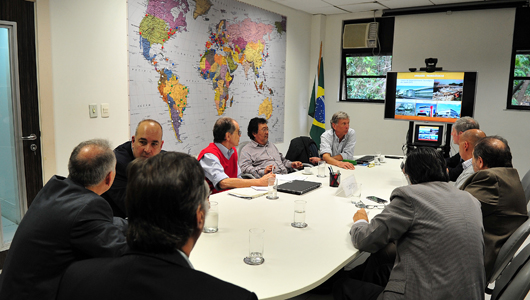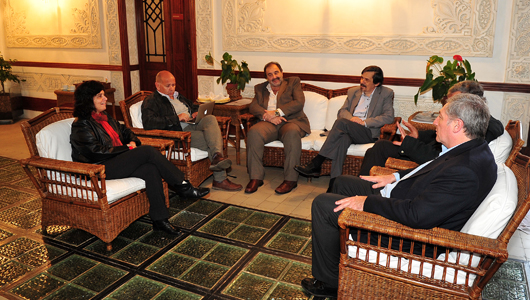Fiocruz and the Argentine Ministry of Health assess partnerships
11/09/2017
André Costa e Ricardo Valverde (CCS)
A delegation from the Argentine Department of Health was at Fiocruz in last July 19th with the aim to evaluate a strategic cooperation agreement, especially in the field of production of pharmaceuticals. Over the course of several meetings, the group assessed possibilities of partnership in fields such as yellow fever vaccine, coordinated use of capacities for the production of reagents and diagnostic kits, production of medicines and the organization of a joint symposium on technoscience development in the health care field between both countries, among others.

The mission of the neighboring country was formed by the chief officer of the National Administration of Laboratories and Health Institute (Anlis), Carlos Ubeira, by the Secretary of Policies, Regulation and Institutes of the Argentine Ministry of Health, Raúl Alejando Luis Ramos, and by the chairman of the National Agency of Public Laboratories., Adolfo Sanchez de Leon.
Referring to challenges and interests common to both countries, Anlis's chief officer emphasized "the theme of medicines, particularly some orphan medicines, that the industry does not produce, and over which the Government should take responsibility. This is the case, for example, of tuberculosis: as they are low cost medicines, the market looks at who can pay for them, and tuberculosis ends up in a void, because it is a disease that affects low income people. This is a clear example of how the Government should analyze these voids and which strategy we should develop between the departments".
Ubeira also said that both countries "are looking for a strategic cooperation. We have common objectives in terms of health policy, which are not limited to commercial or technological subjects. Fiocruz has a lot of experience in some cases in which we do not have. In Argentina there is a significant private pharmaceutical industry, but not a public one".
The Argentine delegation met with the President of the Foundation, Nísia Trindade Lima; with the Vice- President of Production and Innovation in Health, Marcos Krieger; the advisers of the Fiocruz Global Health Center (Cris/Fiocruz), José Roberto Ferreira, Felix Rosenberg, Álvaro Matida and Sebastian Tobar; with the managers and representatives of the Institute of Technology in Immunobiologicals (Bio-Manguinhos/Fiocruz), Mauricio Zuma and Antonio Barbosa; with the chief officer of the Institute of Technology in Pharmaceuticals] (Farmanguinhos), Jorge Mendonça; and with the representative of the National Institute of Infectious Diseases Evandro Chagas (INI/Fiocruz), Marília Santini.
Yellow fever and tuberculosis are priorities
The two sides evaluated a partnership with the goal of strengthening the technological capabilities of Anlis in the final phase of vaccine production. This installation could be used for the vaccine of yellow fever and other diseases.
Complementing the cooperation on vaccines, it was suggested that, in this matter, there are possibilities of coordinating both countries' capacities for technological development and joint production of reagents and diagnostic kits.
Also in the production theme, both parties will identify key medicines for epidemiological needs of the health systems of both countries. Initial priority lines may include subjects such as tuberculosis, cutaneous leishmaniasis and antibiotics.
Another relevant topic under discussion was the conduction of a symposium between Argentina and Brazil for the production of medicines and biological medicinal products. The meeting would have the purpose to discuss key aspects of the availability and production of medicines and biological medicinal products, and priority lines for joint development.
The event would also take advantage of the centenary of the creation of Malbrán Institute, one of the predecessors of Anlis, and of the Oswaldo Cruz Year, which marks the centenary of the death of the patron of the Foundation, to analyze the contributions of Carlos Malbrán and Oswaldo Cruz for the consolidation of Argentina and Brazil’s national health systems. November 2017 has been proposed as a possible date for the conduction of the symposium.
"Very productive meetings"
The last appointment of the day of the Argentine delegation was a meeting with the President of Fiocruz, Nísia Trindade Lima. The meeting took place at Castelo da Fiocruz, where they discussed other points for the rest of the day.

Trindade Lima emphasized the role Fiocruz in the Brazilian health economic and industrial complex.
According to her, who will soon participate in the Pan American Sanitary Conference, there are many parallels between Anlis, founded in 1916, and Fiocruz, whose embryo, Instituto Oswaldo Cruz, was established a little before, in 1900. Both (Anlis and Fiocruz) are the result of administrative reorganizations that came together into a single entity, in the following decades, health care institutions. In the case of the Anlis, it occurred during the government of Carlos Menem.
"There's a lot to discuss and cooperate in areas such as HIV/Aids, hepatitis, arboviruses, neglected diseases, chronic diseases, health economic and industrial complex, clinical studies, education, primary health care, health surveillance, health at borders and others," said Trindade Lima.
She noted that the Brazilian Health Minister, Ricardo Barros, has recently assumed the commitment to export more vaccines for Latin America. "Anlis and Fiocruz arose in a context in which both countries were oligarchic republics and in which the national governments began to strengthen. We have common origins and issues and, we hope, a common future," said Trindade Lima.


